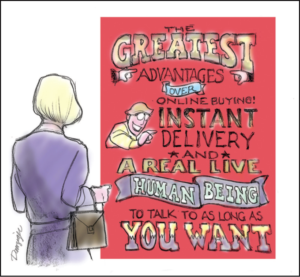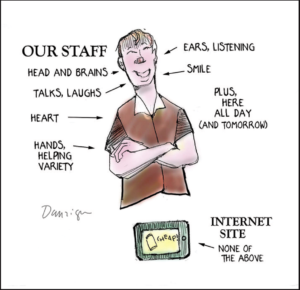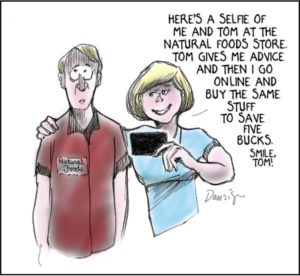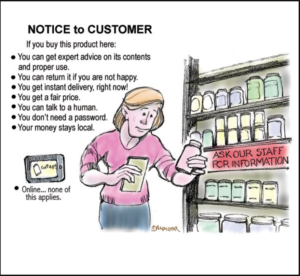 most part, gone. A straight hard-discount vitamin strategy inside of four walls turned out to be an unsustainable business model.
most part, gone. A straight hard-discount vitamin strategy inside of four walls turned out to be an unsustainable business model.Yet, I remember independent natural products retailers in the 90s beginning to complain about educating customers who would then walk down the street to buy the products at that nearby vitamin discount store. Independents began asking themselves why they should spend all the time it takes to educate shoppers, just to have them go somewhere else to shop.
Discounts: An American Pastime Fast forward to 2017, where virtually every customer is armed with a smartphone and price-comparison app (software program application), and the problem has only gotten worse. It’s
 on steroids, actually. The ease with which people can check global pricing within seconds is an addictive drug that plays into the American pastime of finding the absolute lowest price. Let’s face it, we are at fault for encouraging this behavior. For decades marketers have stepped on the discount throttle with all manner of incentives, from EDLP (everyday low price), super Tuesdays, line drives, bogos (buy one get one free), manager’s picks, daily, weekly, and monthly specials, that we have trained shoppers to expect a discount. As an American shopper, making sure we get a discount seems like our patriotic duty.
on steroids, actually. The ease with which people can check global pricing within seconds is an addictive drug that plays into the American pastime of finding the absolute lowest price. Let’s face it, we are at fault for encouraging this behavior. For decades marketers have stepped on the discount throttle with all manner of incentives, from EDLP (everyday low price), super Tuesdays, line drives, bogos (buy one get one free), manager’s picks, daily, weekly, and monthly specials, that we have trained shoppers to expect a discount. As an American shopper, making sure we get a discount seems like our patriotic duty.The Value of Time At the heart of this extreme price-seeking behavior is the issue of time; your time and its value. The 20 minutes, half-hour or more you spend with each customer that becomes
 wasted time when your shopper whips out his or her smartphone and buys online. But it’s not only your time that’s wasted. Your customer is devaluing their time as well. Instead of taking the product they already have in hand, they are willing to wait an additional one, two or three days to receive a shipment from the online vendor — just to save a few dollars. How much is their time worth? Less than a couple dollars a day? How serious are they about getting better? Shouldn’t they value their health over saving a buck, and start using the products right away?
wasted time when your shopper whips out his or her smartphone and buys online. But it’s not only your time that’s wasted. Your customer is devaluing their time as well. Instead of taking the product they already have in hand, they are willing to wait an additional one, two or three days to receive a shipment from the online vendor — just to save a few dollars. How much is their time worth? Less than a couple dollars a day? How serious are they about getting better? Shouldn’t they value their health over saving a buck, and start using the products right away?No Scolding As an independent natural products retailer, you’ve realized how few options you have for handling price-seeking customers. You can’t charge for your nutritional advice, because your other retail competitors continue to give the same advice for free. And, you can’t yell at your customers, or lecture them on manners and respect. They’ll just walk out the door. So, what can you do?
Fight Fire with…Satire While directly criticizing someone will turn them off, laughing at them can have a dramatic
 effect. When you hold up a mirror to bad behavior — through parody or caricature — you are much more likely to generate the response you want: a little much needed self-reflection, and perhaps an eventual change in behavior.
effect. When you hold up a mirror to bad behavior — through parody or caricature — you are much more likely to generate the response you want: a little much needed self-reflection, and perhaps an eventual change in behavior.Here are four cartoons I have created with Jeff Danziger, the influential political satirist whose cartoons have graced the pages of Christian Science Monitor, New York Times, and are currently syndicated nationally through the Washington Post Writers Group.
Continuing Need People in the United States will increasingly need health advice, and no one will be able to avoid the aging process. The Millennial generation, 77 million strong, is the largest in our history, with aches and pains presenting at an earlier age than any previous generation. Capturing your share of shoppers depends on how proactive you are willing to be, from the beauty of your physical store presentation, to your carefully curated product mix, to the skill of your nutrition team. Using humor to “reset” the customer relationship may prove to be one of your most powerful tools. WF
Images by permission of Jeff Danziger.
Naming Contest
The four cartoons you see here are the first of what I hope to be a series of funny, pointed caricatures that illuminate the most offensive behaviors customers in your stores exhibit. If you’ve got a “You won’t believe what my customer just said…” moment, I’d love to hear about it. I’m sure there are many amazing remarks you’ve heard as your customer begins tapping on their smartphone screen. And, when you share your anecdote with me, you may just see it in a future cartoon.
Also, with this column, we are initiating a contest for the best name for the “smartphone shopper” who takes your advice for free, and then shops online. If you are the winner — the independent natural products retailer whose smartphone shopper name we select — you will enjoy a $100 gift card, and a customized cartoon, with your store name on it, honoring your efforts. (Submit your entries to: jay@retailinsights.com.)
Jay Jacobowitz is president and founder of
 Retail Insights®, a professional consulting service for natural products retailers established in 1998, and creator of Natural Insights for Well Being®, a comprehensive marketing service designed especially for independent natural products retailers. With 40 years of wholesale and retail industry experience, Jay has assisted in developing over 1,000 successful natural products retail stores in the U.S. and abroad. Jay is a popular author, educator, and speaker, and is the merchandising editor of WholeFoods Magazine, for which he writes Merchandising Insights and Tip of the Month. Jay also serves the Natural Products Association in several capacities. He can be reached at (800)328-0855 or via e-mail at jay@retailinsights.com.
Retail Insights®, a professional consulting service for natural products retailers established in 1998, and creator of Natural Insights for Well Being®, a comprehensive marketing service designed especially for independent natural products retailers. With 40 years of wholesale and retail industry experience, Jay has assisted in developing over 1,000 successful natural products retail stores in the U.S. and abroad. Jay is a popular author, educator, and speaker, and is the merchandising editor of WholeFoods Magazine, for which he writes Merchandising Insights and Tip of the Month. Jay also serves the Natural Products Association in several capacities. He can be reached at (800)328-0855 or via e-mail at jay@retailinsights.com.









